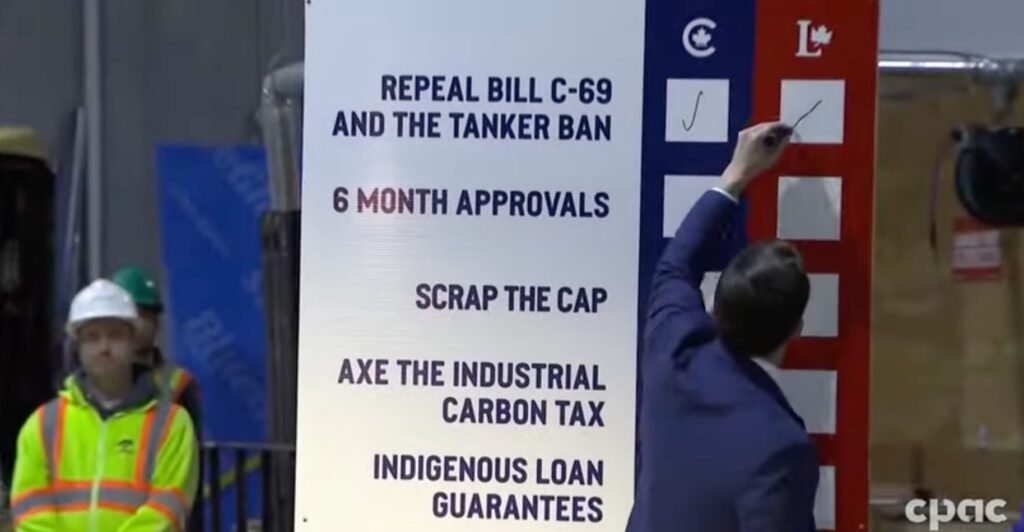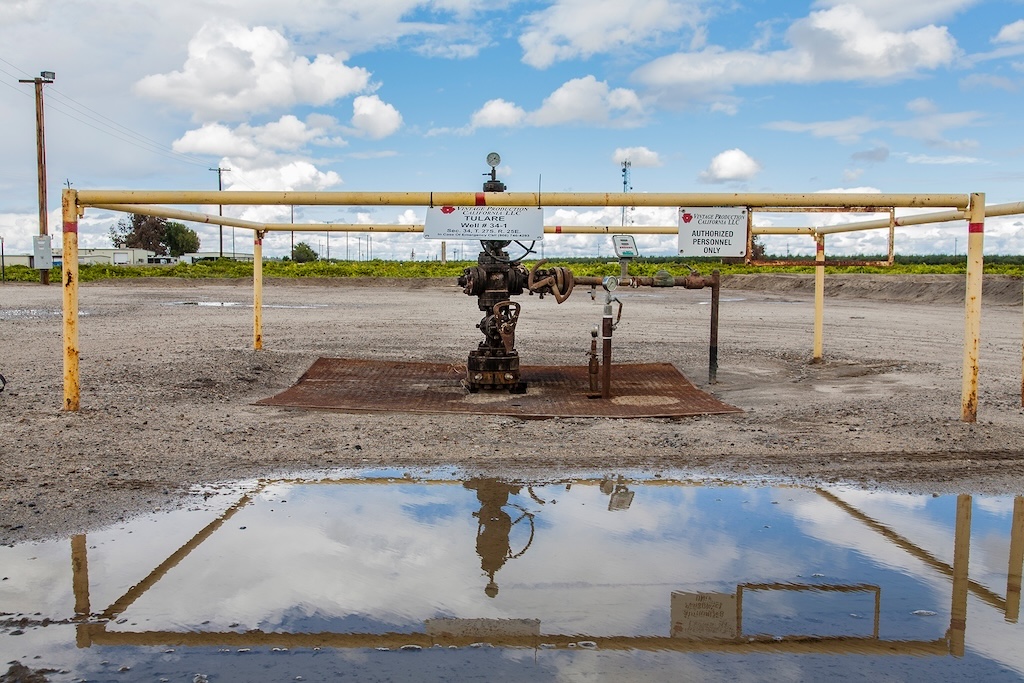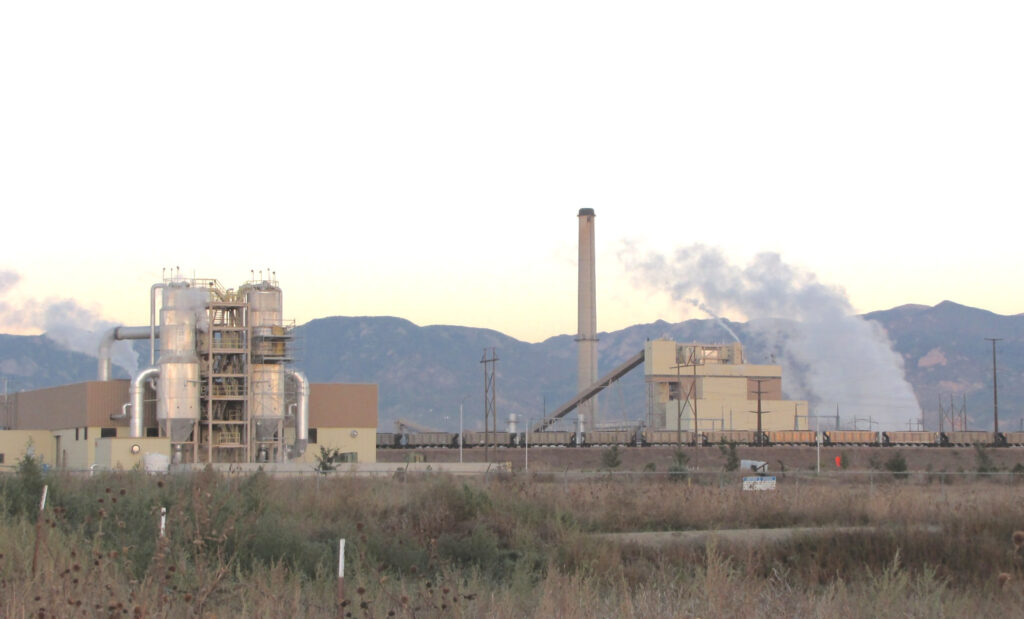Alberta Premier Danielle Smith appeared to suggest she would consider amending her blanket opposition to the so-called West Coast tanker ban if the federal government were to assist in the development of an oil export terminal in Prince Rupert, British Columbia.
For weeks Premier Smith has been calling for a major oil pipeline project to B.C.’s northern coast and an end to the tanker ban as part of a list of demands to newly-elected Prime Minister Mark Carney. In a media scrum following her keynote at the Global Energy Show in Calgary, the premier suggested Prince Rupert’s port could be exempted from the ban.
“On the issue of the tanker ban, maybe we come to an agreement that if all roads lead to the port of Prince Rupert, just carve out port of Prince Rupert so that we can continue to protect the rest of the coast,” she said. “I can live with that.”
The Oil Tanker Moratorium Act, passed by Justin Trudeau’s Liberal government in 2019, restricts ships carrying more than 12,500 tonnes of crude oil, but does not ban oil tankers entirely.
Smith repeatedly called for the legislation to be repealed during her conversation with veteran reporter and broadcaster Peter Mansbridge at the Calgary conference Tuesday. She addressed the ban in the context of Carney’s advocacy for new pipelines, arguing that as long as the tanker ban is in place, new pipelines to the Pacific are pointless. Her later comment to reporters initially sounded like a pivot or compromise.
But environmentalists say Smith’s proposal to “carve out” a portion of West Coast waters doesn’t make any sense. “This would be the equivalent of the National Hockey League banning cross-checking, unless it happens in front of the net or in the corners,” said Keith Stewart, senior energy strategist with Greenpeace Canada, in a statement to DeSmog.
“It would defeat the purpose of protecting British Columbia’s coast and critical salmon habitat from oil spills from supertankers coming into the port or from the pipeline that would have to be built to get the oil there.”
Sam Blackett, press secretary to Premier Danielle Smith, confirmed to DeSmog that the premier had not previously discussed the idea with Prime Minister Mark Carney, but was proposing the idea to enable the development of a new pipeline.
Alberta environment minister Rebecca Schulz also argued against the tanker ban during a panel discussion the previous day.
Eliminating the tanker ban was one of several demands issued by chief executives of Canada’s oil and gas sector during Canada’s federal election campaign. The CEOs repeated their request to Carney after he won. These demands were endorsed by Smith and conservative leader Pierre Poilievre.

More industry coming to Prince Rupert
Prince Rupert is a coastal city and deepwater port in northern British Columbia. A floating LNG export terminal has been proposed, and the continued construction of a 900-kilometre gas pipeline was recently approved by the British Columbia government.
A new report from the Institute for Energy Economics and Financial Analysis (IEEFA) says the Ksi Lisims LNG project faces a wide variety of major risks, including regulatory, financial, and infrastructural.
“Compounding these risks is an impending global LNG supply glut, weak demand growth, and inflationary trade actions,” reads an IEEFA statement. The absence of a secured pipeline to supply feed gas is a major challenge, though the IEEFA also notes domestic Canadian market dynamics are changing, and that the proposed terminal’s main competitive advantage — proximity to Asian markets — may not be enough to secure long-term competitiveness for the project.
“For members of the public, potential short- to medium-term economic gains must be weighed against long-term risks to affordability, environmental quality and economic stability,” reads the report.
While the tanker ban doesn’t prohibit liquid natural gas, similar risks and concerns weigh on proposed fossil fuel export development in Canada. Desire to reverse the tanker ban comes on the heels of a recent Canadian federal election and a trade war initiated by US President Donald Trump. Prime Minister Mark Carney has proposed Canada become an energy superpower in response to these threats.
The ban isn’t new, as a de facto moratorium had been in place for decades. Moreover, tanker traffic is not banned elsewhere on Canada’s Pacific Coast, and the port of Vancouver has a considerable oil export terminal. Pacific Coast oil export capacity increased with the completion of the Trans Mountain Pipeline, which in turn led to a sevenfold increase of tanker traffic through the Juan de Fuca Strait, increasing from one per week before the pipeline opened in the spring of 2024, to one per day by last October.
In May, the CBC reported that the pipeline isn’t running at full capacity. In April, Reuters reported that the pipeline had downgraded their oil export forecasts for the next three years. Some analysts suggested the problem was the high tolls oil companies were being charged by the government to use the pipeline, which cost Canadian taxpayers $34 billion, up from initial estimates of $4.5 billion.
Bad deal for Canada?
As recently reported by the National Observer, the federal government locked in toll rates for the pipeline at $11 per barrel, a fee that was determined before the pipeline’s final cost was established, which the Observer argues is less than half of what’s needed just to break even.
Experts argue there’s no necessity for additional oil infrastructure in British Columbia, for a wide variety of reasons.
“Already as of 2021, the International Energy Agency was clear: if we want a climate-safe future, the world must stop building and subsidizing new oil and gas infrastructure,” said Thomas Green, senior climate policy adviser with the David Suzuki Foundation.
“Even as wildfires rage across Canada — fueled by climate change caused by burning fossil fuels — some are pushing to build more pipelines and lift the West Coast tanker ban,” said Green in a statement to DeSmog.
Green notes that British Columbians overwhelmingly support the tanker ban, primarily to protect coastal ecosystems which are already under stress from ocean acidification, warming waters, plastic pollution, and increasing marine traffic.
“Scrapping the ban to expand fossil fuel exports will only make future summers worse,” said Green.
“It’s also a risky bet: global markets are rapidly shifting toward electrification and cheaper renewable energy. In this smoky summer, it’s time to clear the air about the risks of buying into big oil’s agenda. Doubling down on yesterday’s dirty technologies doesn’t just threaten our environment — it undermines Canada’s economic future and the wellbeing of our communities.”
Subscribe to our newsletter
Stay up to date with DeSmog news and alerts






